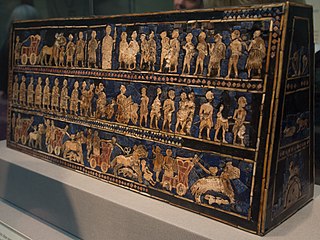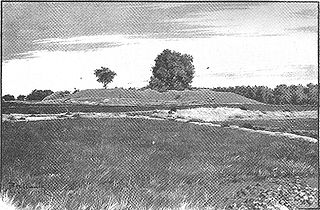
The Cambridge World History is a seven volume history of the world in nine books published by Cambridge University Press in 2015. The editor in chief is Merry E. Wiesner-Hanks. The history takes a comparativist approach.

The Cambridge World History is a seven volume history of the world in nine books published by Cambridge University Press in 2015. The editor in chief is Merry E. Wiesner-Hanks. The history takes a comparativist approach.
Speaking in 2013, the editor of volume three, Norman Yoffee, described the history as being "conceived by a group of world historians, that is people who insist that large indeed global relations are essential in understanding local histories, and they are dedicated comparativists." [1]
Each volume is organised as a series of essays with accompanying photographs, illustrations, diagrams and maps. The separate volumes take a thematic and chronologically overlapping approach. The first volume discusses the period before the invention of writing including the Paleolithic era to 10,000 BCE. The second discusses the development of agriculture and the period 12,000 BCE to 500 CE. Later volumes cover progressively shorter but still overlapping periods.
The work is in seven volumes over nine books, volumes 6 and 7 being published in two parts each. [2]

Ancient history is a time period from the beginning of writing and recorded human history through late antiquity. The span of recorded history is roughly 5,000 years, beginning with the development of Sumerian cuneiform script. Ancient history covers all continents inhabited by humans in the period 3000 BC – AD 500, ending with the expansion of Islam in late antiquity. The three-age system periodises ancient history into the Stone Age, the Bronze Age, and the Iron Age, with recorded history generally considered to begin with the Bronze Age. The start and end of the three ages vary between world regions. In many regions the Bronze Age is generally considered to begin a few centuries prior to 3000 BC, while the end of the Iron Age varies from the early first millennium BC in some regions to the late first millennium AD in others.
Human history is the record of humankind from prehistory to the present. Modern humans evolved in Africa around 300,000 years ago and initially lived as hunter-gatherers. They migrated out of Africa during the Last Ice Age and had spread across Earth's continental land except Antarctica by the end of the Ice Age 12,000 years ago. Soon afterward, the Neolithic Revolution in West Asia brought the first systematic husbandry of plants and animals, and saw many humans transition from a nomadic life to a sedentary existence as farmers in permanent settlements. The growing complexity of human societies necessitated systems of accounting and writing.

The following outline is provided as an overview of and topical guide to ancient India:

Kenneth Pomeranz, FBA is University Professor of History at the University of Chicago. He received his B.A. from Cornell University in 1980, where he was a Telluride Scholar, and his Ph.D. from Yale University in 1988, where he was a student of Jonathan Spence. He then taught at the University of California, Irvine, for more than 20 years. He was elected a Fellow of the American Academy of Arts & Sciences in 2006. In 2013–2014 he was the president of the American Historical Association. Pomeranz has been described as a major figure in the California School of economic history.

Lal Kot or Qila Rai Pithora is a fortified complex in present-day Delhi, which includes the Qutb Minar complex. It was constructed in the reign of Rajput Tomar ruler Anangpal Tomar between c. 1052 - c.1060 CE. It is termed as the "First city of Delhi". Remains of the fort walls are scattered across South Delhi, visible in present Saket, Mehrauli around Qutb complex, Sanjay Van, Kishangarh and Vasant Kunj areas.
Muzaffar Alam is the George V. Bobrinskoy Professor in South Asian Languages and Civilizations at the University of Chicago.
The Industrious Revolution was a period in early modern Europe lasting from approximately 1600 to 1800 in which household productivity and consumer demand increased despite the absence of major technological innovations that would mark the later Industrial Revolution. Proponents of the Industrious Revolution theory argue that the increase in working hours and individual consumption traditionally associated with the Industrial Revolution actually began several centuries earlier, and were largely a result of choice rather than coercion. The term was originally coined by the Japanese demographic historian Akira Hayami to describe Japan during the Tokugawa era. The theory of a pre–industrial Industrious Revolution is contested by some historians.

The political history of Mysore and Coorg (1761–1799) is the political history of the contiguous historical regions of Mysore State and Coorg province on the Deccan Plateau in west-central peninsular India from the time of the rise of Haidar Ali in 1761 to that of the death of his son Tipu Sultan in 1799.

The political history of Mysore and Coorg (1800–1947) is the political history of the contiguous historical regions of Mysore state and Coorg province located on the Deccan Plateau in west-central peninsular India, beginning with the acceptance of British suzerainty in 1800 to the independence of India in 1947.

Sanjay Subrahmanyam is a historian of the early modern period. He is the author of several books and publications. He holds the Irving and Jean Stone Endowed Chair in Social Sciences at UCLA which he joined in 2004.
The World History Association Bentley Book Prize is an annual award given by the World History Association. It was first awarded in 1999 as the World History Association Book Prize; the name was changed in 2012 to honor Jerry H. Bentley. The prize is $500.

Lauren Benton is an American historian known for her works on the global history of empires, colonial and imperial law, and the history of international law. She is Barton M. Biggs Professor of History and Professor of Law at Yale University.

Ahli Shirazi, full name Muhammad ibn Yusuf Ahli Shirazi, was a Persian poet who lived in Shiraz, Iran from circa 1454 to 1535. He is buried in Hafezieh.

Craig G. Benjamin is an Australian-American historian who is professor of history in the Frederik J. Meijer Honors College at Grand Valley State University, where he teaches East Asian civilization, big history, ancient Central Asian history, and world history historiography. In 2014 and 2015 he served as president of the World History Association.

Merry E. Wiesner-Hanks is an American historian and Distinguished Professor Emerita at the University of Wisconsin–Milwaukee's Department of History. She describes herself as wearing "... two hats, one as a historian of early modern Europe and the other as a world/global historian, with a primary focus on women, gender, and sexuality within these". She has taught and published in European history, world history, and history pedagogy, and served as the President of the Sixteenth Century Society, the Society for Reformation Research, The Society for the Study of Early Modern Women and Gender, and the World History Association.
Norman Yoffee is a senior fellow of the Institute for the Study of the Ancient World at New York University. He was previously professor in the Department of Near Eastern Studies and the Department of Anthropology at the University of Michigan. Yoffee is the editor of The Cambridge world history volume 3: Early cities in comparative perspective, 4000 BCE–1200 CE.

Shaji-ki-Dheri is the site of an ancient Kanishka stupa about 6 kilometers from Peshawar, Pakistan.
André Wink is an emeritus professor of history at University of Wisconsin, Madison. He is known for his studies on India and the Indian Ocean area, particularly over the medieval and early modern age. He is the author of a series of books published by Brill Academic, Oxford University Press, and Cambridge University Press on al-Hind – a term used in Arab history to refer to the Islamized regions in the Indian subcontinent and nearby regions.
Dirk Herbert Arnold Kolff is a Dutch historian and Indologist. Born at Rotterdam in the Netherlands, Kolff earned a doctorate degree from the Leiden University in 1983 with a doctoral thesis on the research subject of armed peasantry in northern India. He is a professor emeritus of modern South Asian history and the former Chair of Indian History at the Leiden University.